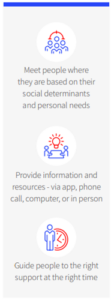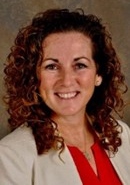By Nicole Robertson, MPH, and Trish Pangilinan, MSW, LCSW
This year an estimated 2 million new cancer cases will be diagnosed in the United States. Advancements in prevention, detection, treatment and survivorship continue, but not everyone has benefited. For many people with cancer, care is often fragmented and poorly coordinated, with barriers to receiving timely, patient-centered services.
For over 30 years, the American Cancer Society (ACS) has viewed patient navigation as a key tactic to increasing access to timely cancer care. We have advocated for navigation-related public policy, researched the role and benefits of navigation, funded efforts to build navigation programs.
As oncology social workers know, patient navigation is a proven health service delivery model that can fill critical gaps in the cancer care system. This personalized assistance offered to patients, families, and caregivers can help them overcome individual- and system-level barriers to receive quality health care. Navigation is one of the only interventions that has been demonstrated to help health systems address disparities in cancer care.
Navigation has been effective in increasing access to and completion of cancer screenings and treatment for populations disproportionately burdened by societal and health inequities, such as racial and ethnic minorities, immigrants and refugees, people with low income, and people in underserved rural areas. By supporting diverse groups, navigation can improve the overall patient care experience and lead to sustainable and equitable health solutions.
To enhance navigation through technology, ACS created the ACS CARES™ (Community Access to Resources, Education, and Support) app, which is designed for people with cancer, their families, and caregivers. This app leverages a standardized, validated assessment tool to systematically identify unmet needs of families experiencing cancer. These unmet needs may be for health or cancer-related information or related to social drivers of health— the circumstances in which people are born, grow up, live, work, and age that impact one’s quality of life and ability to deal with cancer. Based on the CARES assessment, the technology tool curates information and resources (transportation, lodging, financial health, etc.) to address these unmet needs and barriers to care.
At any point during the app experience, users can tap an icon to speak live to ACS team members. The program complements the clinical navigation support that health care systems provide, so that social workers can maximize their oncology expertise and focus on clinical needs.
 Users of the free ACS CARES mobile app are able to:
Users of the free ACS CARES mobile app are able to:
- Access personalized, quality cancer related information that updates as you age, as your situation changes, or as new information becomes available.
- Speak directly with American Cancer Society cancer information specialists when you have questions day or night, 365 days a year in any language.
- Find reliable information on addressing important topics such as emotional health, finances, transportation, and dependent support.
- Connect virtually with trained community volunteers who share the same cancer experience and background including diagnosis, location, military status, race, and ethnicity.
The individuals with whom we all work have unique, individualized needs. By using technology and developing this app, we’ve made it easier to help someone at any time during any part of their cancer journey. Through the CARES app, we can guide families to the right information, resources, and support at the right time.
You can learn more about how ACS CARES can help those families with whom you work here: ACS CARES™ | American Cancer Society or download the ACS CARES app.


